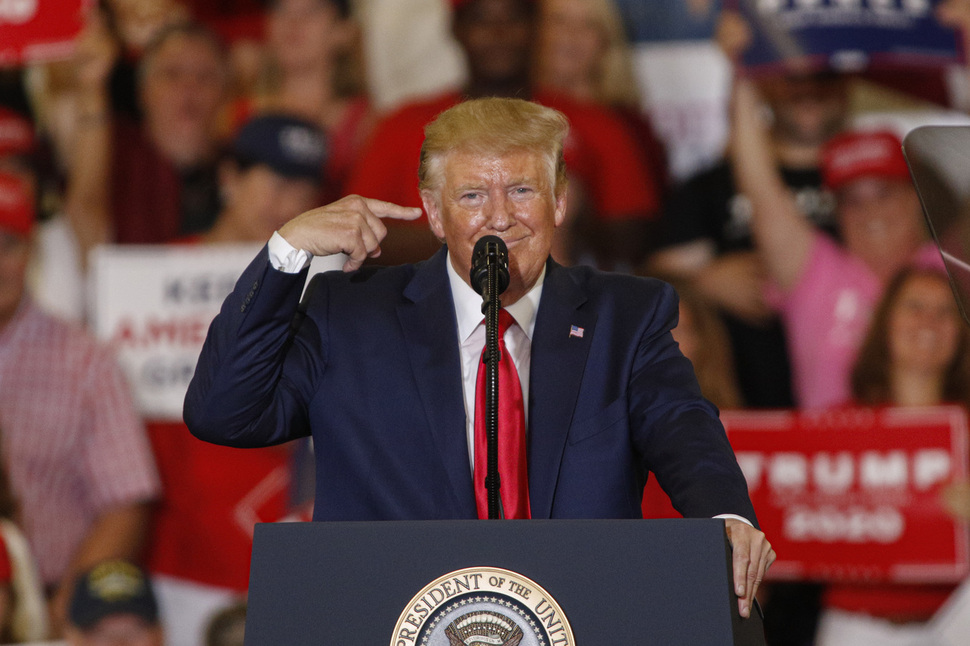 |
|
US President Donald Trump during a campaign rally in Fayetteville, North Carolina, on Sept. 9. (UPI/Yonhap News)
|
3rd N. Korea-US summit may happen before end of 2019
Over the past few days, US President Donald Trump has made a series of conciliatory overtures to North Korea, taking a positive attitude about the possibility of a third summit. The next question is how North Korea will respond, as Pyongyang has requested “new calculations” from the US and expressed its willingness to hold working-level talks with Washington at the end of this month. When reporters at the White House asked Trump on Sept. 12 whether he would meet North Korean leader Kim Jong-un this year, Trump said, “At some point, yes.” “They’d like to meet. I think it’s something that will happen. And we’ll see,” Trump said, adding, “I think something can happen.” Trump’s remark that a third summit could be held before the end of the year is particularly striking as it comes immediately after the departure of White House National Security Advisor John Bolton, one of the US’ most notorious hawks. When reporters at the White House asked Trump on Sept. 11, the day before, who Bolton’s replacement was likely to be, Trump said, “I have five people that want it very much” and moved into unprompted criticism of remarks Bolton made last year about the “Libyan model.” “But we were set back very badly [with North Korea] when John Bolton talked about the Libyan model. And he made a mistake,” Trumps aid. “And as soon as he mentioned that, the ‘Libyan model,’ what a disaster. Take a look at what happened to Qaddafi, with the Libyan model. And he’s using that to make a deal with North Korea? And I don’t blame Kim Jong Un for what he said after that.” Bolton provoked intense pushback from North Korea in May 2018 when he held up the Libya model — in which compensation comes only after denuclearization is complete — as a model for North Korea’s denuclearization. Libyan leader Muammar el-Qaddafi declared he was abandoning his nuclear program in 2003 and handed the equipment over to the US the following year; in 2011, he was deposed and killed by rebels. Trump has openly criticized Bolton for those remarks while repeatedly emphasizing that North Korea has immense potential. Trump’s comments follow a Sept. 9 statement by North Korean First Vice Foreign Minister Choe Son-hui that expressed the North’s willingness to resume working-level talks with the US at the end of the month. Shortly after Choe’s statement, Trump said that “having meetings is a good thing,” and he has been moving to set the mood for resuming the talks. While Bolton’s resignation resulted from disagreements with Trump in several areas of foreign policy, Trump apparently hopes to use his departure to ease the way for reopening the talks. In order to make progress in foreign policy before next year’s presidential election, Trump needs to prevent tensions from escalating with North Korea while also arranging nuclear talks with Kim, the North Korean leader. Because of his trusting relationship with Kim, Trump believes that negotiations with North Korea would be easier to control than talks with Iran, Afghanistan, or Venezuela. The success of North Korea-US talks, including a potential third summit, depends on what incentives both sides bring to the table: namely, what denuclearization measures North Korea offers and what compensation the US is willing to give. On Sept. 12, Trump remained noncommittal when asked about the North’s demand for a “new calculation.” On Sept. 13, the US Treasury Department’s Office of Foreign Assets Control OFAC announced that it was sanctioning three groups of North Korean hackers: the Lazarus Group, Bluenoroff, and Andariel. The step reconfirms that the US is maintaining pressure on North Korea even as it takes steps to revive dialogue. By Hwang Joon-bum, Washington correspondent Please direct comments or questions to [english@hani.co.kr]





